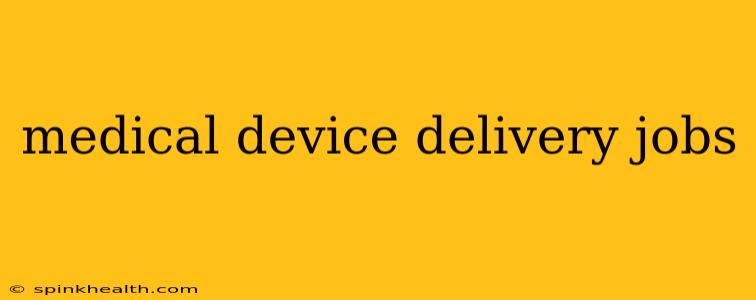Navigating the World of Medical Device Delivery Jobs: A Journey from Warehouse to Patient
The hum of activity in a medical device warehouse isn't just about boxes and barcodes; it's about the lifeline of healthcare. Every package holds the potential to improve or save a life, making a career in medical device delivery a uniquely rewarding and challenging experience. This isn't just about logistics; it's about precision, responsibility, and contributing to a system that impacts millions. Let's delve into the intricacies of this vital sector.
What are the Different Types of Medical Device Delivery Jobs?
The world of medical device delivery isn't monolithic. It's a multifaceted system with various roles, each demanding specific skills and expertise. You might find yourself working in:
-
Warehouse Operations: This involves the heart of the operation—receiving, storing, and distributing medical devices. Roles here range from entry-level positions like warehouse associates to more specialized roles like inventory managers and logistics specialists. Precision and attention to detail are paramount; a misplaced item can have serious consequences.
-
Transportation and Logistics: Getting those critical devices to their destination on time and in perfect condition is crucial. This often involves working with trucking companies, managing shipping schedules, and ensuring compliance with strict regulatory requirements. Roles here might include dispatcher, transportation coordinator, or even a driver specializing in temperature-sensitive goods.
-
Customer Service and Support: Dealing directly with healthcare facilities and patients requires exceptional communication and problem-solving skills. This might involve answering queries, tracking shipments, handling returns, and managing potential issues with deliveries.
-
Regulatory Compliance: The medical device industry is heavily regulated. Ensuring adherence to these regulations in the delivery process is critical, requiring specialized knowledge and attention to detail. Roles could include compliance officers, quality control specialists, and regulatory affairs professionals.
What Skills are Needed for Medical Device Delivery Jobs?
Beyond the obvious logistical skills, success in this field demands a unique blend of abilities. Let's explore some key requirements:
-
Attention to Detail: Accuracy is non-negotiable. Mislabeling, incorrect storage, or delayed deliveries can have life-altering consequences.
-
Organizational Skills: Managing inventory, tracking shipments, and coordinating with multiple stakeholders requires exceptional organizational abilities.
-
Problem-Solving Skills: Unexpected delays, damaged goods, or logistical hiccups are inevitable. The ability to think on your feet and find solutions is essential.
-
Technical Proficiency: Familiarity with warehouse management systems (WMS), transportation management systems (TMS), and other relevant software is often a must.
-
Communication Skills: Effective communication with colleagues, clients, and regulatory bodies is vital for smooth operations.
-
Understanding of Regulations: Familiarity with FDA regulations and other relevant guidelines is crucial for roles involving compliance.
How Much Do Medical Device Delivery Jobs Pay?
Salary expectations vary significantly based on the specific role, location, experience, and employer. Entry-level positions might offer competitive hourly wages, while more senior roles or those requiring specialized skills can offer substantial salaries and benefits packages. Researching specific roles and locations is crucial to understanding realistic salary expectations.
What Education and Experience are Needed?
Educational requirements vary depending on the specific role. Some entry-level positions may only require a high school diploma or GED, while others may prefer or require a college degree in logistics, supply chain management, or a related field. Experience in warehousing, transportation, or customer service can be highly advantageous.
What is the Career Growth Potential in Medical Device Delivery?
The career path in this field is surprisingly diverse. With experience and skill development, you can progress to supervisory roles, managerial positions, or specialized roles within logistics, compliance, or regulatory affairs. Opportunities for advancement are readily available for dedicated and skilled professionals.
The world of medical device delivery isn't just about moving boxes; it's about ensuring life-saving technologies reach those who need them. With its blend of challenges and rewards, it's a career path offering stability, growth, and the profound satisfaction of contributing to something bigger than yourself.

